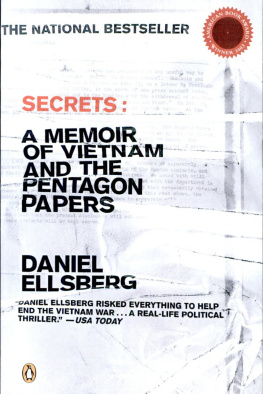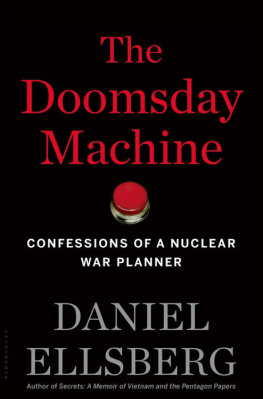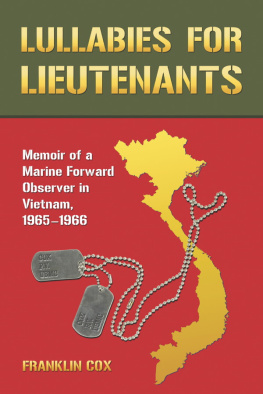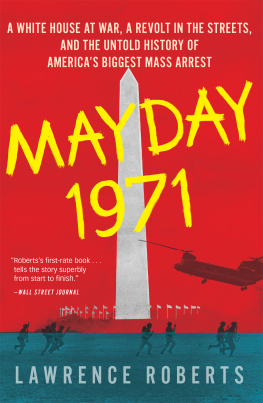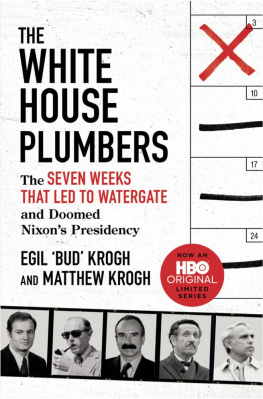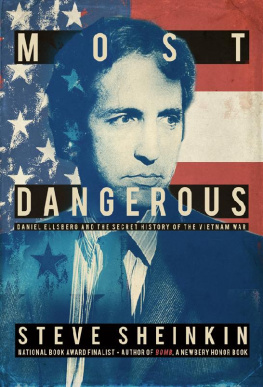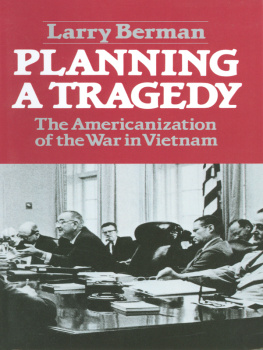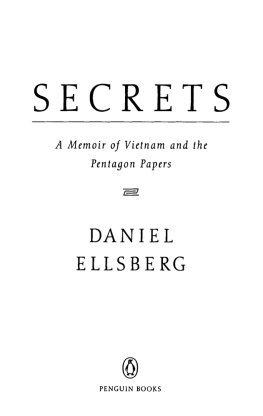PREFACE
On the evening of October 1, 1969, I walked out past the guards desk at the Rand Corporation in Santa Monica, carrying a briefcase filled with top secret documents, which I planned to photocopy that night. The documents were part of a 7,000-page top secret study of U.S. decision making in Vietnam, later known as the Pentagon Papers. The rest of the study was in a safe in my office. I had decided to copy it all and make it public, perhaps through Senate hearings or the press, if necessary. I believed this course, especially the latter possibility, would probably put me in prison for the rest of my life. How I came to do this is the focus of this memoir.
For eleven years, from mid-1964 to the end of the war in May 1975, I was, like a great many other Americans, preoccupied with our involvement in Vietnam. In the course of that time I saw it first as a problem, next as a stalemate, then as a moral and political disaster, a crime. The first three parts of this book correspond roughly to these emerging perceptions. My own personal commitment and subsequent actions evolved along with these changing perspectives. When I saw the conflict as a problem, I tried to help solve it; when I saw it as a stalemate, to help us extricate ourselves, without harm to other national interests; when I saw it as a crime, to expose and resist it, and to try to end it immediately. Throughout all these phases, even the first, I sought in various ways to avoid further escalation of the conflict. But as late as early 1973, as I entered a federal criminal trial for my actions starting in late 1969, I would have said that none of these aims or effortsneither my own nor anyone elseshad met with any success. Efforts to end the conflict-whether it was seen as a failed test, a quagmire, or a moral misadventure-seemed no more to have been rewarded than efforts to win it. Why?
As I saw it then, the war not only needed to be resisted but remained to be understood. Thirty years later I still believe that to be true. This book represents my continuing effortfar from completeto understand my countrys war on Vietnam, and my own part in it, and why it took so long to end both of those.
For three years starting in mid-1964, with the highest civil service grade, I had helped prosecute a war I believed at the outset to be doomed. Working in Washington under top decision makers in 1964-65, 1 watched them secretly maneuver the country into a full-scale war with no real promise of success. My pessimism during those years was not unbroken, and for about a yearfrom the spring of 1965 to the spring of 1966I hoped for and worked toward some sort of success. That was after the president, despite many misgivings, including his own, had committed us to war. Once we were fully committed, I volunteered in mid-1965 to serve in Vietnam as a State Department civilian. My job came to be evaluating pacification in the countryside. In this I drew on my earlier training as a marine infantry commander to observe the war up close. Whether we had a rightany more than the French before usto pursue by fire and steel in Indochina the objectives our leaders had chosen was a question that never occurred to me. But during two years in Vietnam, its people and plight became real to me, as real as the U.S. troops I walked with, as real as my own hands, in a way that made continuing the hopeless war intolerable.
Knocked out of the field with hepatitis and back in the United States in mid-1967, I began to do everything I could imagine to help free our country from the war. For two years I did this as an insider, briefing high officials, advising presidential candidates, and eventually, in early 1969, helping the presidents national security adviser, Henry Kissinger, discover uncertainties and alternatives. But later that same year I felt called on to go beyond this approach and so to end my career as a government insider.
One of these actions risked my own freedom. In 1969 and 1970, with the help of my friend Anthony Russo, a former Rand associate, I secretly photocopied the entire forty-seven-volume Pentagon Papers, a top secret study of U.S. decision making in Vietnam from 1945 to 1968, which were then in my authorized possession, and gave them to Senator William Fulbright, chairman of the Senate Foreign Relations Committee. In 1971 I also gave copies to the New York Times, to the Washington Post, and ultimately, in the face of four unprecedented federal injunctions, to some seventeen other newspapers, all of which defied the government in printing them for the public to read.
I wasnt wrong about the personal risks. Shortly thereafter I was indicted in a federal court, with Russo later joining me in a second, superseding indictment. Eventually I faced twelve federal felony charges totaling a possible 115 years in prison, with the prospect of several further trials for me beyond that first one. But I was not wrong, either, to hope that exposing secrets five presidents had withheld and the lies they told might have benefits for our democracy that were worthy of the risks. This truth telling set in motion a train of events, including criminal White House efforts to silence or incapacitate me, that led to dismissal of the charges against me and my codefendant. Much more important, these particular Oval Office crimes helped topple the president, an act that was crucial to ending the war.
This is the story of the greatest change in my life, which began well after my return from Vietnam. The disillusionment of the brief hopes that I experienced in Vietnam and the skepticism toward the war that I brought back in mid-1967 were not really new for me. On the contrary, they were a return to the pessimism that I had acquired on a first trip to Vietnam in 1961 and that had been reinforced in my first year in the Pentagon from mid-1964. By 1967 this skeptical mood was widely shared inside the government, perhaps even more than in the public. This was a time when my general desire to see the war ended did not distinguish me from almost any of my colleagues in the government or government-sponsored research, whether or not they had served in Vietnam. An entire generation of Vietnam-era insiders had become just as disillusioned as I with a war they saw as hopeless and interminable. I was like them in most respects, no different in character or values, no less committed to the cold war, to anticommunism, to secrecy, and to the presidency. By 1968, if not earlier, they all wanted, as I did, to see us out of this war. Indeed this poses a question that I have worked at understanding ever since: How could it be, under these circumstances, that after the massive disillusionment of the Tet offensive in early 1968 the war still had seven years to go?
The heart of this memoir tells the story of how it was that starting from this common insiders position critical of our policy, I eventually came to go beyond efforts to stop the war from within the executive branch, to be willing, instead, to give up clearances and political access, the chance of serving future presidents, my whole career, and to accept the prospect of a life behind bars. It focuses on what in my experience made it possible for me to do in 1969 through 1972 what I now wish I (or others) had done in 1964 or 1965: go to Congress and the press and tell the truth, with documents.
Its easy to say that the idea of doing this simply didnt occur to me at the time, any more than it did to others. The question remains why it didnt. Like so many, I put personal loyalty to the president (and to my career, my access to inside information and influence, however I idealized my purposes) above all else. Above loyalty to the Constitution. Above obligation to truth, to fellow Americans, and to other human lives. It was the face-to-face example, for which I will always be grateful, of young Americans who were choosing to go to prison rather than to take part in a war they knew was wrong that awakened me to these higher loyalties.

